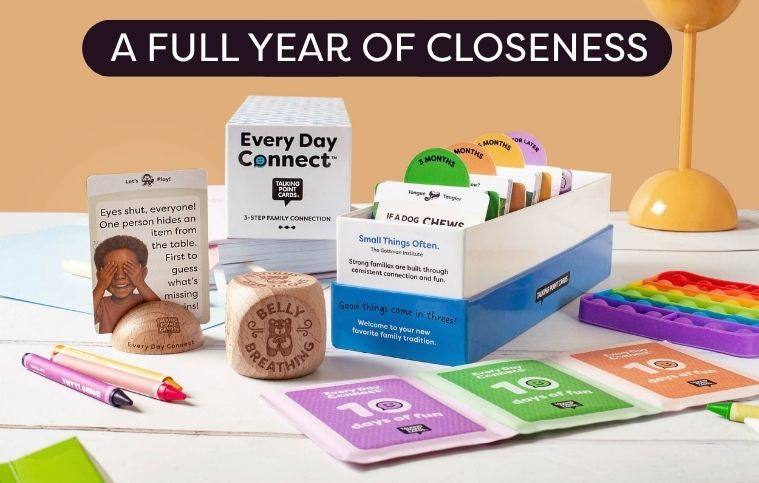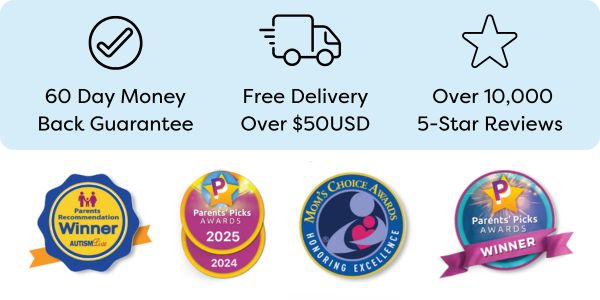SHOP
About
The 5 Reasons
It's Actually Really Fun
Time Is Not On Our Side
How To Start Tonight
The Gift That Keeps Giving
Shop Family Products
There's something magical that happens when your 8-year-old asks your mom about her first job, and suddenly you're hearing stories you've never heard before. Stories about resilience, about dreams, about the person your parent was before they became... well, your parent.
But here's the thing that keeps me up at night sometimes: these stories are disappearing faster than we realize.
Every day, we lose pieces of our family's history. Not because we don't care, but because life gets busy. Because we assume there will always be "next time" to ask those questions. Because somehow, between school pickups and work deadlines and that endless cycle of laundry, the stories our grandparents are dying to tell just... don't get told.
So today, I want to share something with you. Five reasons why recording your family's stories isn't just nice to have—it's essential. And more importantly, how you can start tonight, right over dinner, without any fancy equipment or awkward interview setups.
1. Your Kids Will Thank You (Even If They Don't Know It Yet)
Let me paint you a picture. Your 12-year-old is going through that phase where everything is "boring" and they'd rather be on their phone than anywhere else. But then Grandpa starts telling the story about the time he hitchhiked across three states to see Grandma, and suddenly... your pre-teen is leaning in.
Here's what I've learned: kids crave connection to something bigger than themselves. They want to know where they come from, what struggles their family overcame, what kind of grit runs in their DNA.
When children understand their family history, something incredible happens. Research shows they develop stronger self-esteem, better coping skills, and a clearer sense of identity. They stop seeing themselves as just "me" and start seeing themselves as part of a legacy.
Think about it - when your child knows that their great-grandmother started a business during the Depression, or that their grandfather overcame dyslexia to become a teacher, they carry that resilience forward. They understand that challenges aren't roadblocks; they're part of the family story.
But if we don't capture these stories now, our kids will grow up without this foundation. They'll miss out on knowing that the determination they show on the soccer field or the kindness they demonstrate to friends isn't just who they are - it's who they come from.
2. You'll Discover Your Parents Are Actually Fascinating Humans
Okay, confession time. I thought I knew my dad pretty well. I mean, he's my dad, right? I've lived with him, argued with him about curfew, watched him get excited about lawn mowing techniques.
But then one evening, completely by accident, I asked him about his college years. And suddenly this man I thought I knew everything about was telling me stories about protests he organized, about the time he drove eight hours to surprise my mom on her birthday, about dreams he had that I never knew existed.
It hit me: our parents had entire lives before we came along. Rich, complex, full-of-adventure lives. They were young once (I know, shocking). They took risks, fell in love, made mistakes, had dreams that maybe didn't pan out and others that exceeded their wildest expectations.
When we take the time to really ask about their stories - not just "how was your day" but "what was your biggest fear when you were my age?" - we get to meet the full human behind the parent role. And honestly? It changes everything.
You start seeing your mom not just as the person who packed your lunches, but as the woman who moved to a new city where she knew no one because she believed in her dreams. You see your dad not just as the guy who taught you to ride a bike, but as the young man who worked three jobs to put himself through college.
This shift in perspective doesn't just enrich your relationship - it gives you permission to see yourself as a full, complex human too.
3. These Stories Are Your Family's Secret Superpower
Every family has them: the stories that get passed down, the ones that make everyone lean in closer, the ones that somehow contain all the wisdom your family has gathered over generations.
Maybe it's the story about how your grandmother fed the entire neighborhood during hard times with just a pot of soup and endless love. Maybe it's about how your grandfather built his business from nothing, or how your parents met in the most unlikely circumstances.
These aren't just cute anecdotes. They're your family's operating manual.
When life gets tough (and it will), these stories become touchstones. They remind us what we're capable of, what values we hold, what kind of people we want to be. They're proof that our family doesn't just survive challenges - we figure out how to thrive through them.
But here's the heartbreaking part: if we don't make the effort to capture these stories, they disappear. And with them goes all that accumulated wisdom, all those examples of resilience, all that proof of what's possible.
I think about families who have lost their storytellers during the pandemic, who suddenly realized they'll never hear certain stories again. The regret is real, and it's permanent.
Your family stories aren't just entertainment—they're your legacy. They're the way you pass down not just what happened, but what it means. They're how you teach the next generation that they come from people who figured things out, who loved deeply, who didn't give up.

Rated #1 Generations Product
Strengthen family bonds, spark fun and meaningful conversations, and create connection that lasts.

4. It's Actually Really Fun (No, Seriously)
I know what you're thinking. Recording family stories sounds like work. Like something you'd need to plan and organize and probably fail at because who has time for that?
But what if I told you it could be as simple as pulling out a card at dinner and asking, "Grandma, what was your favorite subject in school?"
The magic isn't in the formal interview setup. It's in the moment when your 85-year-old grandmother lights up talking about the poetry she used to write, or when your usually quiet uncle starts cracking jokes about his teenage mishaps.
Some of my favorite family story sessions have happened in the most random places. In the car on long drives. While doing dishes together. During commercial breaks while watching TV. The stories that come out when the pressure is off, when everyone is relaxed and laughing—those are often the best ones.
And here's what I love most: when you start asking these questions regularly, it becomes a family habit. Kids start asking their own questions. Grown-ups start volunteering stories. Suddenly everyone realizes that sharing family history isn't a chore - it's actually the best part of getting together.
Plus, you'll be amazed at what you learn. The seemingly quiet family members often have the most surprising stories. The relatives you thought you knew well will reveal completely unexpected sides of themselves.
5. Time Is Not on Our Side (But That's Okay)
This one's hard to talk about, but we need to. Every day we wait to capture these stories is a day closer to losing them forever.
I don't want to be dramatic, but I also don't want you to experience the regret I've seen in so many families. The regret of realizing too late that Grandpa had incredible stories about his service overseas, but now he's gone and no one thought to ask. The regret of losing Grandma before anyone captured her amazing cooking stories or learned about her childhood.
The truth is, we often assume we have more time than we do. We think we'll ask these questions next holiday, next visit, next year when things aren't so crazy.
But here's what I've learned: there is no perfect time. There's only now.
The good news? You don't need much time to start. Even ten minutes of genuine curiosity can unlock incredible stories. Even one question asked with real interest can open up conversations that last for hours.
And once you start, it gets easier. Stories lead to more stories. Questions lead to more questions. What starts as a simple "tell me about your wedding day" becomes an entire evening of laughter and tears and connection.
How to Start Tonight (It's Easier Than You Think)
Okay, so you're convinced that capturing family stories matters. But where do you actually start?
The key is making it feel natural, not forced. You don't need recording equipment or formal interview questions or a big announcement that you're now "documenting family history."
You just need curiosity and the willingness to listen.
Start with one simple question over dinner. Something like:
-
"What's the best advice anyone ever gave you?"
-
"What was your first job like?"
-
"Tell me about a time you were really proud of yourself."
-
"What's something you believed when you were young that you don't believe anymore?"
The magic happens when you follow up with genuine interest. When someone shares a story, ask for more details. "What did that feel like?" "What happened next?" "How did that change you?"
And here's a little secret: you don't have to record everything to preserve it. Sometimes the most important thing is just creating the space for stories to be told, for connections to be made, for family members to feel heard and valued.
That said, if you want to make it even easier (and way more fun), there are tools that can help. I've been using something called Talking Point Cards: Generations Edition, and honestly, it's been a game-changer for our family.
Instead of struggling to think of good questions, you just flip a card and boom—instant conversation starter. The questions are crafted by experts who understand how to get people talking without making it feel like an interrogation. Plus, they're designed to work for all ages, so kids can participate without getting bored.
What I love most is how it removes the pressure. No one has to be the "interviewer" or worry about asking the right questions. You just pick a card, read it out, and watch as the stories start flowing.
The Gift That Keeps Giving
Here's what happens when you make family storytelling a regular thing: it changes how your family relates to each other.
Suddenly, your teenager sees their grandparent as someone who also navigated young love and friendship drama. Your parents see their own parents not just as authority figures, but as people who had dreams and fears and hopes just like everyone else.
These stories become the threads that weave your family closer together. They create inside jokes and shared references. They give everyone a sense of belonging to something bigger than themselves.
And maybe most importantly, they ensure that the wisdom, love, and resilience that your family has accumulated over generations doesn't die with the people who lived it.
So tonight, over dinner, ask one question. Just one. See what happens when you give someone permission to share their story.
Because here's the truth: your family's stories aren't just history. They're your roadmap for the future. They're proof of what's possible. They're the legacy you pass down.
And they're waiting for you to ask.
Ready to start capturing your family's stories but not sure which questions to ask? The Talking Point Cards: Generations Edition takes the guesswork out of meaningful conversation. With expert-crafted questions designed to work for all ages, it's the easiest way to turn any dinner into a story-sharing session. Learn more about how it works here.
At Talking Point Cards, we believe that meaningful connection starts with simple, heartfelt conversations. Our collection of easy-to-use, engaging conversation starters helps families of all shapes and sizes put down their screens, lean in, and truly listen to one another - one question at a time. Because stronger families aren’t built in grand gestures - they’re built in everyday moments.
Let's Stay Connected
Love what you’re reading? There’s more where that came from. Get fresh ideas, inspiring tips, and simple ways to spark deeper conversations - delivered straight to your inbox. Because the best connections start here. Just pop in your email below to join us.
We respect your privacy. We’ll never share or sell your information. By subscribing, you agree to receive emails from us. Unsubscribe anytime.












